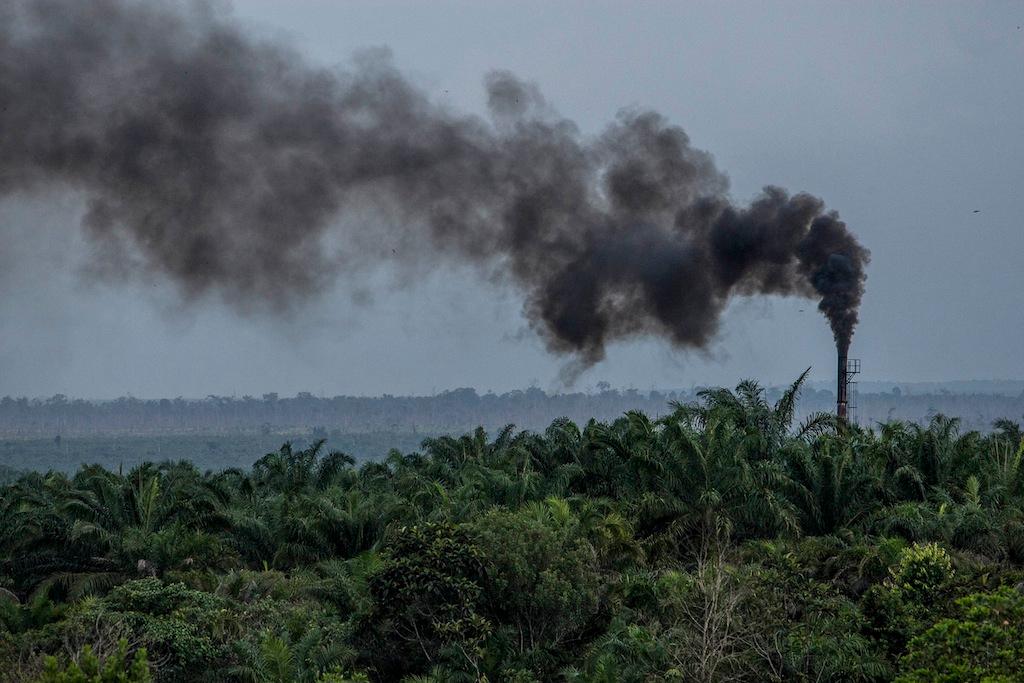Two of America’s food giants commit to fighting climate change
PEKANBARU, SUMATRA, INDONESIA – JULY 12: A view of a palm oil plantation in Pelalawan district on July 12, 2014 in Riau province, Sumatra, Indonesia. According to Greenpeace, the destruction of forests is driven by the expansion of palm oil and pulp & paper has increased the greenhouse gas emissions, pushing animals such as sumatran tigers to the brink of extinction, and local communities to lose their source of life.
In a breakthrough in the fight against climate change, two of the biggest global food giants – Kellogg's and General Mills – have announced their commitment to cut greenhouse gas emissions in their agricultural supply chains. Kellogg's released their new climate policy on Wednesday, specifying their targets to reduce harmful emissions, trailing a similar announcement by General Mills on July 28. Both companies made the public statement following public pressure from advocacy group Oxfam America and their campaign’s over 238,000 supporters.
“Kellogg’s new commitments add momentum to calls on government and the wider food and agriculture industry to recognize that climate change is real, it’s happening now, and we need to tackle it,” said Monique van Zilji, manager for Oxfam’s ‘Behind the Brands’ campaign, in a press release on Wednesday.
Kellogg's will, for the first time, start reducing greenhouse gas emissions from agricultural production, which is where the majority of the company’s climate pollution takes place, according to Oxfam. Meanwhile General Mills’ commitment has “leapfrogged the company to the top of the industry in terms of engaging in climate action,” said Heather Coleman, Oxfam’s climate manager.
But these are just two of the 10 big food and beverage companies that an Oxfam report has identified as both vulnerable to climate change as well as major contributors to this burning international issue.
Major contributors to climate change
According to Oxfam’s report, these 10 companies together emit so much greenhouse gas that they could constitute the 25th most polluting country in the world by themselves. The eight other companies on this list other than Kellogg's and General Mills are Associated British Foods, Coca-Cola, Danone, Mars, Mondelez International, Nestle, PepsiCo and Unilever.
Bad production practices like deforestation and overuse of dirty fertilizers contribute to these dangerous emissions. If these companies reduce their emissions by 80 million tons by 2020 – and Oxfam claims they can – this would “be equivalent to taking all of the cars in Los Angeles, Beijing, London and New York off the road.” Currently they produce 263.7 million tons of greenhouse gases, more than half coming from the production of agricultural materials from their supply chains.
The earlier targets set by these two companies to reduce harmful emissions were neither science-based nor a reflection of their full contribution to the problem, as per Oxfam. Moreover, the advocacy group’s investigations revealed that an Indonesian supplier of palm oil to both these companies is “allegedly involved in burning forest land to produce palm oil.” This contributed to a massive forest fire that has created greenhouse gas emissions “equivalent to the annual emission from 10.3 million cars.”
Both these companies have now joined BICEP (Business for Innovative Climate and Energy Policy), which is an advocacy coalition of business that work with policy makers to pass climate and energy legislation. They have also signed on to the group’s ‘Climate Declaration,’ joining a list of signatories that include big American businesses like Apple, Nike and Disney.
The fight against harmful emissions
Greenhouses gases – carbon dioxide, methane, nitrous oxide and others – trap heat to the earth’s atmosphere, increasing temperatures across the globe. Of these, carbon dioxide makes up 77 percent of greenhouse emissions, and US is one of the top emitters, second only to China.
The Intergovernmental Panel on Climate Change (IPCC) said earlier in April this year that even if global emissions were lowered by 40 to 70 percent by 2050 and reduced to near-zero by the end of the century, it would still result in an increase of the global average temperature by two degrees Celsius. Most of the greenhouse emissions are caused by industries producing oil, gas and coal.
However this is just a fraction of this campaign against reducing effects of climate change. The eight other food producing companies have yet to make any bold moves, though Oxfam and its allies have approached them already.
“Some companies are already doing better than others, so there are some laggards and some stand-out leaders in the pack,” said Coleman. “We hope that some of the remaining laggards start taking on some of these commitments.”
Oxfam has been partnering with other advocacy groups and activists as part of the campaign. These include the Rainforest Action Network, Greenpeace, and Change.org.
“Our approach is really a critical friend approach – we don’t want to demonize these companies,” explained Coleman. “A lot of actions are most effective in working through allies.”
While Coleman said that they were surprised at how quickly General Mills made their commitment – within two months after Oxfam launched their campaign – she said it just signified how powerful public and consumer pressure can be on a big, public-facing brand like General Mills. “That’s an empowering message and one that consumers should feel pretty excited about.”
More from GlobalPost: 97 percent, 49 billion, and 3 more convincing climate change numbers
We want to hear your feedback so we can keep improving our website, theworld.org. Please fill out this quick survey and let us know your thoughts (your answers will be anonymous). Thanks for your time!
